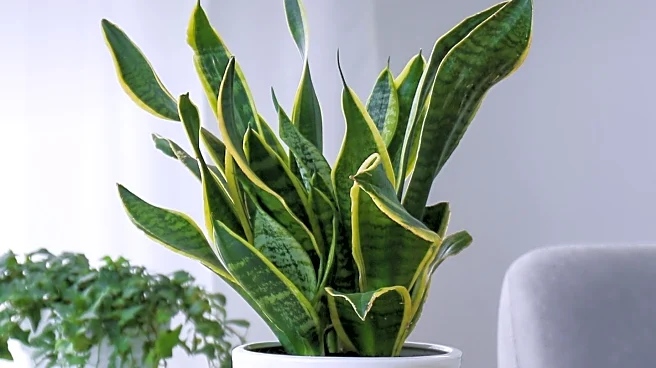What's Happening?
CNET has published an article discussing the benefits of houseplants in purifying indoor air and enhancing home comfort. The article emphasizes that certain plants, such as Gerbera daisies, are effective in absorbing pollutants like trichloroethylene and benzene, commonly found in household cleaners and solvents. These plants not only improve air quality but also reduce allergens, deter pests, and help regulate humidity. The article references a NASA study that identified several plants capable of cleaning the air, including the marble queen pothos, peace lily, English ivy, and Gerbera daisy. While the effectiveness of plants in significantly improving air quality is debated, they are noted for their ability to add aesthetic value and boost mood.
Why It's Important?
The significance of this development lies in the growing interest in natural solutions for improving indoor air quality. As concerns about air pollution and its health impacts rise, houseplants offer a cost-effective and aesthetically pleasing alternative to traditional air purifiers. This trend could influence consumer behavior, leading to increased demand for air-purifying plants and potentially impacting the horticulture industry. Additionally, the integration of biotechnology, as seen with Neoplants' enhanced air-purifying system, represents a merging of natural and technological solutions, which could pave the way for innovative approaches to environmental challenges.
What's Next?
The article suggests that while houseplants can contribute to better air quality, they are not a replacement for dedicated air purifiers, which are necessary for filtering dust and fine particulate matter. As awareness of the benefits of houseplants grows, consumers may increasingly seek out plants that offer both air purification and aesthetic appeal. This could lead to further research and development in the field of plant biotechnology, aiming to enhance the air-purifying capabilities of common houseplants. The horticulture industry may also see a shift towards promoting plants with proven air-cleaning properties.
Beyond the Headlines
The use of houseplants for air purification touches on broader themes of sustainability and environmental consciousness. It reflects a cultural shift towards integrating nature into urban living spaces, promoting mental well-being and ecological balance. This trend may encourage more sustainable practices in home design and urban planning, emphasizing green spaces and biophilic design principles. Additionally, the ethical considerations of genetically modifying plants for enhanced air purification could spark discussions on the balance between technological advancement and natural preservation.









